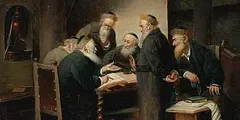Torah: Korach (Numbers 16:1-18:32) Haftarah: (I Samuel 11:14-12:22)
I will be traveling from June 24 through July 12 (late evening) visiting Italy, Israel and England.
The Torah continues with the rebellion of Korach, Dathan, Abiram, and On. The destruction of the rebels, the vindication of Aaron, additional rules for the Levites, and the priestly tithes and tithes for the support of the Levites. Challenging authority, Tithe, Miracles in the Torah, and Pidyon Haben are the notable concepts, values and Mitzvot.
After the uprising against Moses by Korach and his followers, some commentators consider the earthquake which swallows Korach and his followers to have been one of G-d’s many miracles. Later in the Torah portion, Moses commands each of the twelve tribal chieftains to bring a staff to be placed in the sanctuary. The next day he discovered that Aaron’s staff had miraculously sprouted, producing blossoms and almonds. Miraculous events are reported throughout the Torah: Balaam’s talking donkey, the splitting of the Red Sea, manna from heaven, just to mention just a few. Early Jewish commentators suggested that all these miracles were planned by G-d at the very being of creation.
Pidyon Haben is the redemption of the firstborn son. It is the religious duty incumbent on every member of the Jewish people to redeem from the kohen his son who is firstborn of his Jewish mother (Numbers 18:15). Early in Jewish history, the firstborn males were dedicated to G-d’s service, acting as servants in the Temple. This may have proven a hardship on families. When the tribe of Levi was appointed to act as servants in the Temple, the requirements of service for the firstborn were eliminated. Every firstborn Israelite had to be redeemed by payment of five shekels to a member of the tribe Levi.
While I will be in Israel, I will be praying at the Kotel (Wailing Wall) in Yerushalayim for everyone’s health, happiness and peace. I will also be checking in with Ellen Nathan, sending photos to Mike Satter, and receiving information. I may not always have WiFi, and contact will be limited.
Shabbat Shalom,
Rabbi Helene Ainbinder







